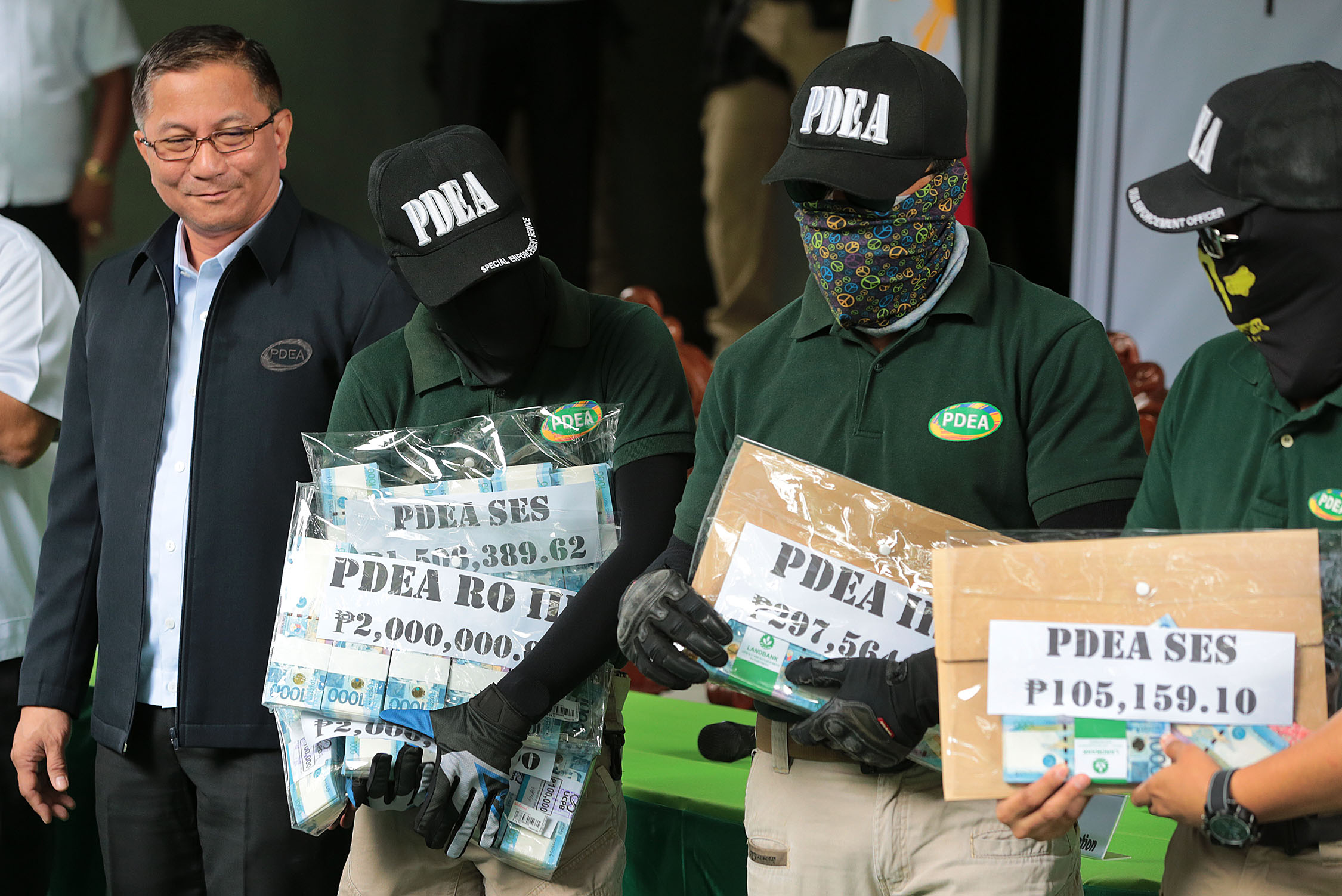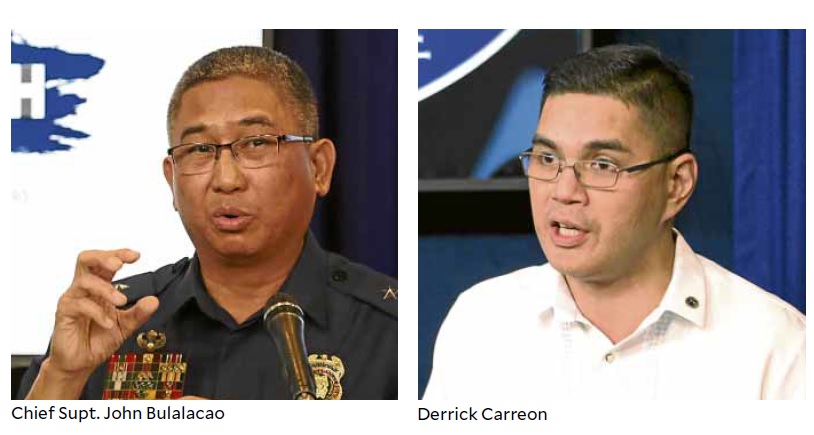‘No evidence linking rights groups to drugs’

REWARD PDEA Director General Aaron Aquino (left) hands out cash rewards to agents for their successful antidrug operations at their headquarters in Quezon City on Tuesday. —GRIG C. MONTEGRANDE
The Philippine National Police and Philippine Drug Enforcement Agency (PDEA) on Tuesday said they had no evidence to back the allegations by presidential spokesperson Harry Roque and Foreign Secretary Alan Peter Cayetano that human rights groups could now be “unwitting tools” of drug lords.
International and local human rights groups have denounced President Rodrigo Duterte’s ferocious war on drugs, in which thousands of people have been killed, either by police or by shadowy, unidentified masked gunmen.
The Presidnets, who says he must be tough to protect the people from the scourge of drugs, has criticized human rights groups for “trivializing” his campaign and unjustly blaming the authorities for the bloodshed.
“We have none right now,” the PNP spokesperson, Chief Supt. John Bulalacao, said when asked about proof of links between drug syndicates and human rights groups.
“But as what has been mentioned by [the PDEA], we would continue to validate these reports that drug syndicates may be using human rights groups to discredit the efforts of the government,” Bulalacao said in a press briefing at Malacañang.
PDEA spokesperson Derrick Carreon said the allegations that drug lords were using human rights groups to attack the government’s antidrug efforts were based on recent findings that would have to be investigated.
“We still have to dig further on this,” Carreon said. “But seeing the trend of how they attack the antidrug campaign, we can only surmise it might be unwitting [on the part of the] human rights groups that they are being capitalized on or made as leverage by drug groups.”
The PDEA and PNP are undertaking honest, well-planned efforts to beat the illegal drug scourge but continued to be attacked, he said.
Carreon said the criticisms were attacks against the antidrug campaign, not just against the deaths resulting from the operations.
Any attack against the campaign would be advantageous to the drug lords, he added.
On Monday, Roque said drug lords could be funding some human rights groups to discredit the government.
He insisted in another statement on Tuesday that the links between human rights groups and drug traffickers were possible.
‘Unwitting tools’
“We stand by the statement we made on the possibility that some nongovernment organizations, instead of assisting the government fulfill its human rights obligations, have become unwitting tools of drug lords,” Roque said in Tuesday’s statement.
“Such scenario, we reiterate, should not be discounted given the billion-peso losses of the drug lords,” he added.
Cayetano first aired the allegations on Sunday, saying some human rights groups have been “unwittingly used” by drug lords to counter the government’s war on drugs. “That’s the reality,” he said.
Targets of death squads
The New York-based Human Rights Watch (HRW) on Monday slammed the statements by Roque and Cayetano as “shockingly dangerous and shameful.”
HRW urged both officials to withdraw their statements.
“Are they trying to have death squads target human rights activists? Cayetano and Roque provide no evidence. They should withdraw their comments immediately,” HRW said in a statement.
In response, Roque said HRW should “not feel alluded to, exaggerate and politicize the issue to get some media mileage and public attention.”
Bayan Muna Rep. Carlos Isagani Zarate said Roque’s “reckless” statement “put the lives of our human rights advocates in grave danger.”
“That was an irresponsible statement by Harry Roque, who, tragically, came from the human rights community. He’s dishing out statements without evidence and ruining people’s lives,” Zarate said.
He said Roque’s “fake news” was meant to “divert attention from the fact that the administration’s bloody war on drugs is a failure.”
‘Sad and ironic’
“It is very sad and ironic that under this government it is the human rights advocates who are on the terrorist list, while drug lords are exonerated of their crimes and it is the poor that are being killed,” Zarate said, referring to the dismissal by state prosecutors of drug charges against the President’s wedding cosponsor and alleged drug lord Peter Lim and confessed drug dealer Kerwin Espinosa.
 The danger of “dispensing allegations without proof” was not lost on the Commission on Human Rights (CHR).
The danger of “dispensing allegations without proof” was not lost on the Commission on Human Rights (CHR).
“Rather than attacking human rights bodies and human rights defenders, we urge the government to display sincere commitment to transparency and the rule of law by allowing unhampered investigations to take place and show that perpetrators of human rights violations are brought to justice,” CHR spokesperson Jacqueline de Guia said.
The allegations against the human rights groups followed a move by the government to declare more than 600 people terrorists for their alleged involvement in the Communist Party of the Philippines and its armed wing, the New People’s Army.
‘Tag incites violence’
Cristina Palabay, secretary general of the human rights group Karapatan, said the hundreds petitioned for proscription included Victoria Tauli-Corpuz, the UN special rapporteur on indigenous peoples’ rights, and 45 other human rights defenders and activists.
Karapatan has written to Michael Frost, UN special rapporteur on the situation of human rights defenders, and Annalisa Ciampi, the special rapporteur on the rights to freedom of peaceful assembly and of association, to decry the listing.
“Mr. Duterte is sending out a warning, a threat that anyone who goes against his government will be immediately labeled a ‘terrorist,’ a tag that incites violence against individuals and justifies rights violations against them. The process of listing individuals is very arbitrary, malicious and highly irresponsible,” Palabay said.
“Like the many ‘lists’ of past regimes, this serves the same purpose—to intimidate, harass, gag dissent, and force rights defenders into silence and submission,” she said. —With reports from Leila B. Salaverria, Nestor Corrales, Vince F. Nonato, Jaymeet T. Gamil and the wires














